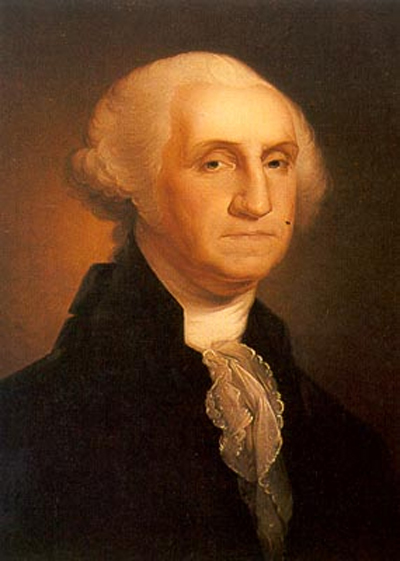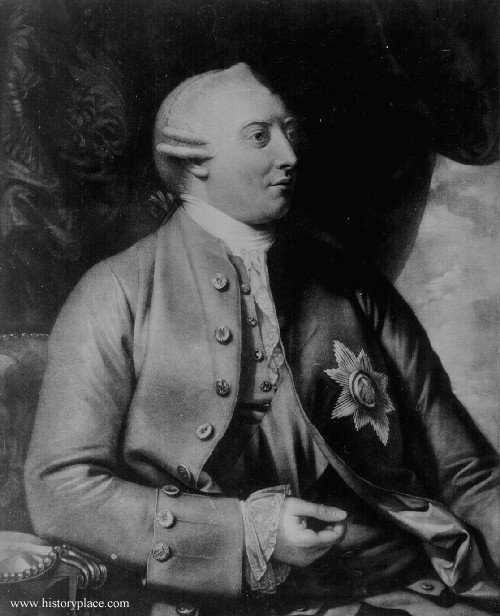George Washington Rejected Kingship, But Would Bush?
George Washington, one of America's greatest leaders and founding fathers, did what few politicians have ever had the fortitude to do: turn his back on offers of absolute power. According to this op-ed article from Turkey's Zaman newspaper, George W. Bush is one of the chief violators of Washington's democratic legacy.
By Ali H. Aslan 
January 2, 2005
Original Article (English)

 Statue of Washington on Wall St. He Took Oath Nearby (above);
Statue of Washington on Wall St. He Took Oath Nearby (above);
The Home of George Washington, in Mount Vernon. (below).

 King George III of England, Defeated By Washington (above);
King George III of England, Defeated By Washington (above);
George Washington as General: He Refused to Be King (below).

 George Bush as Washington: 'Cherry Tree?' (above)
George Bush as Washington: 'Cherry Tree?' (above)
Artist Renditions of Bush as King George Bush (below)


 Nixon-Bush Hologram Drawing (above)
Nixon-Bush Hologram Drawing (above)
Bush and Nixon: Could Dogs Be Part of This? (below)

It is a spring-like day in Washington. Zaman's man in Brussels, Selcuk Gultasli, is my guest. We are going to the historical farm in Mount Vernon, the home of General George Washington, who gave his surname to America's capital.
The belongings of the first U.S. president are protected meticulously as if to embarrass the cellar keepers (!) of the Topkapi Palace [in Turkey]. But the real treasure, not only for the U.S. but for the entire world which believes in the ideals of democracy, is the exceptional political tradition inherited from him.
The fact that the principle of the Separation of Powers was discussed recently in both Turkey and the United States makes our visit to the residence of George Washington even more meaningful. Washington led the commission that introduced this principle into the American Constitution. He was also one of the rare people that could successfully implement this rule, a restriction that many leaders find difficult to adopt. As a matter of fact, there are many anecdotes in the life of Washington to which the current residents of the U.S. Capital should pay heed.
There are also lessons to be drawn by relatively immature democracies such as Turkey. George Washington was the commander-in-chief of the war of independence fought by the U.S. colonies against the British kingdom. After the victory, Washington rejected kingship when it was offered to him by rebellious officers, saving the republic for democracy.
Although he was a victorious commander and a public hero, he was virtually forced into politics as a faits accomplis and was elected President for two consecutive terms. In the end, he abandoned the presidential seat that he occupied for eight years of his own freewill, with no hesitation whatsoever, and saved the United States from starting off as a regime dominated by the military.
Despite the very balanced work of founding fathers like George Washington, the Executive Branch has grown in power compared to the Legislative and Judicial branches, especially in the 20th century. President Theodore Roosevelt (1901-1909) claimed that he had the right to do anything not prohibited by law. World wars and economic crises have negatively impacted the U.S. politically. During World War II, the tradition of a maximum eight-year term for President, initiated by Washington, was discarded in the era of President Franklin D. Roosevelt during. FDR even tries to politicize the Supreme Court. [STACKING THE COURT]
Because covering the President got easier after the visual media revolution, the post of the Presidency was subjected to ever-more press exposure, which gave added weight to the Executive. During the Vietnam War, President Richard Nixon used national security as a pretext to expand his powers. Many of his successors have tried similar tactics, although none went as far as Nixon. For instance, George W. Bush, like Nixon, thinks he is authorized to eavesdrop on American citizens during the process of war, without any warrant from the court.
It was not in vain that The New York Times used the expression "Imperial Presidency" in describing the Bush-Cheney White House, an expression previously used for the Nixon Administration. As you know, Nixon was toppled by reports on the Watergate scandal in the Washington Post, and he had preferred to step down rather than be impeached. The eavesdropping scandal, disclosed by the Times, has already raised speculation that Bush has committed an impeachable crime. Of late, The New York Times, together with the Washington Post has been tossing the Bush government around like a ball, almost as a warning to those in the White House: "Watch your step, or your end might be like Nixon's."
Left wing members of Congress like Senator Barbara Boxer have already begun investigating whether Bush committed an impeachable offense when bypassing Congress and the relevant court by instructing the National Security Agency (NSA) to spy on U.S. terror suspects. But it's doubtful that the Congressional opposition has the political courage to make such a move, especially in an election year. If the man on the street says "whatever the president did, he did it for our security," then the issue could boomerang. Despite the eavesdropping scandal, Bush’s approval rating rose slightly last week.
Meanwhile, the usually divided Democratic Party seems united thanks to rage against Bush. The White House couldn't even get the support it needed to extend the Patriot Act from Republicans. When they return from the Christmas vacation, members of Congress will discuss the Act, the eavesdropping scandal and the approval of Bush’s new Supreme Court nominee, Samuel Alito, who is a defender of eavesdropping.
If the impeachment debate is added to all this, we might witness a real hullabaloo ... The fact that Charles Krauthammer, a columnist close to the White House, wrote on the "absurdity" of the impeachment issue makes one think, "there's no smoke without fire."
As a matter of fact, a protester in front of the White House, which we visited with Selcuk Gultaslı after returning from Mount Vernon, had already started to puff the smoke of impeachment! He was inviting people to join an Internet petition campaign for this very purpose.
George Washington did the right thing by rejecting "kingship" preserving the constitutional balance during his presidency. As for Nixon he lost the Presidential seat, presuming he could sit on a king's throne. I wonder what Bush’s choice would be?
VIDEO: UNSEEN FOOTAGE FROM NIXON'S 1974 RESIGNATION
 WHITE HOUSE NEWS FEED:
Nixon Seems Jovial and Carefree, Joking With Journalists. A Very Strange and Interesting Bit of Footage,
August 8, 1974, 00:09:36
WHITE HOUSE NEWS FEED:
Nixon Seems Jovial and Carefree, Joking With Journalists. A Very Strange and Interesting Bit of Footage,
August 8, 1974, 00:09:36
"Do You Have an Extra Camera in Case the Lights Go Out? ... I Always Worry that they Will Catch Me Picking My Nose."

President Richard Milhous Nixon